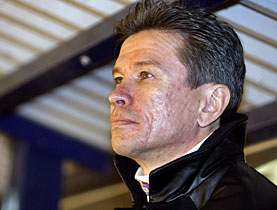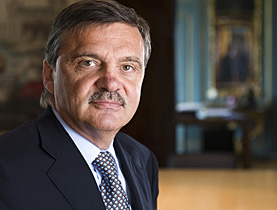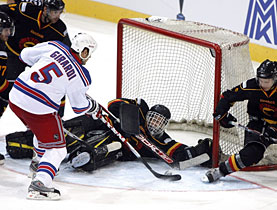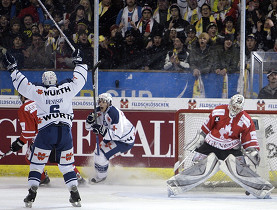How Russians skated into Swiss hockey history

Before becoming coach of Russia's national hockey team, former Soviet player Slava Bykov spent the early 1990s winning games for Swiss club HC Fribourg-Gottéron.
The man behind it all was Jean Martinet, the club’s president at the beginning of the decade. Martinet is credited with having created one of the most formidable duos in Swiss ice hockey history by matching Bykov with fellow Russian Andrei Khomutov.
But how the two powerhouse players came to Fribourg was as much about luck as it was about skilful dealing.
“I had accepted the club presidency in order to help get it out of a difficult situation,” Martinet said. “One day, Titno Catti, who used to play for Olten, called me up to say that Slava Bykov and Andreï Khomutov were free.”
Although Bykov, Khomutov and a third player, Valeri Kamensky, had brought victory to the club CSKA Moscow and to the Soviet Union at the time, the news was a bit lost on Martinet.
Get the Russians
“I didn’t know much about hockey,” he said. “It was explained to me that it was a bit like if Maradona was traded to FC Fribourg.”
Convinced he needed to get the two Russian stars to play for Fribourg, Martinet hopped a plane nine days later, bound for Moscow.
Martinet packed pictures of the Russian stars’ future home, regional maps and descriptions of the schools for their children. He extolled Switzerland’s appeal and the quick and easy ways of moving around that would allow the players to spend more time at home.
“The family aspect played a decisive role,” Martinet said. “In Russia, they only saw their wives and children for a few days each month. That’s what made the difference with offers from other NHL [National Hockey League] clubs. The money wasn’t their main concern.”
As soon as the Russians arrived, Fribourg was smitten. A Russian wave poured into the village. The rink was stuffed to the gills and shopkeepers and residents draped Soviet flags in their windows.
A Russian integration
To ease the transition, Martinet set Bykov and Khomoutov up in a home just a few hundred metres from his own, in Marly, a suburb of Fribourg.
“We looked after them right from the start and that’s certainly one of the reasons why they were integrated so well,” Martinet said. “They were practically like my two children. We even took vacations together.”
Bykov, the extravert, learned French far faster than Khomoutov, the introvert, but the two players didn’t have much of a problem acclimatising to Switzerland. It was in the locker rooms after the matches that cultural shock often struck.
“They couldn’t understand how some players could chitchat after a defeat,” Martinet said. “For them, it was inconceivable.”
But Fribourg didn’t know much about the word “defeat” in the early 1990s. With the dynamic duo setting the tone, Gottéron qualified three consecutive times for the Swiss championship finals.
A phenomenal harmony
The harmony between the two Russian players was outstanding. “Slava and Andreï had between 600 and 700 plays memorised,” Martinet said. “When one had the puck, the other knew exactly where to be.”
When his contract expired in 1998, Bykov left to end his time on the ice in Lausanne. He then went on to start a brilliant career as a coach that took him to CSKA Moscow and later to the Russian national team.
A Fribourg citizen, Bykov spends the majority of his time today in Moscow out of professional obligations. Martinet wishes that his friend could celebrate the second consecutive championship title as Russia’s coach this spring in Switzerland.
But for him, the main thing is that Slava has remained the same guy he met 20 years ago.
“Whether he’s being greeted by Putin in Moscow or by the mayor of Marly, he has the same personality,” Martinet said. “With his career and the feats he’s accomplished, I find that humbleness and temperance extraordinary.”
swissinfo, based on an article in French by Sameul Jaberg
The 2009 Ice Hockey World Championship takes place from April 24 to May 10 in Bern and Zurich.
Over 300,000 spectators are expected to attend and another 800 million will watch on television.
It is the tenth time Switzerland has hosted the tournament.
Early stages: Vyacheslav Bykov was born on July 24, 1960, in Chelyabinsk, to a modest family. He donned skates for the first time when he was eight years old. From early on he made up for his small frame with speed, a good sense of the game and his passing abilities.
KLM: At 18, he joined Metallurg Tcheliabinsk (second division) and then Traktor Tcheliabinsk, a first-division club. Starting in 1982, he teamed up with CSKA Moscow, the Soviet Army team, where the mythic “KLM” trio of Krutov-Larionov-Makarov was born. Under the direction of Victor Tikhonov, the longest-serving national coach, the team won seven championship titles in the USSR.
World titles: At the international level, Bykov captured the world championship title with the Soviet Union in 1983, 1986, 1989 and 1990 and with Russia in 1993. He is a two-time Olympic champion: in 1988 with the USSR in Calgary, and in 1992 with Russia in Albertville.
Fribourg-Gottéron: In 1990, club president Martinet pulled off the coup of the century in bringing Bykov and Khomutov to Fribourg. Bykov would play seven seasons with his famous jersey No. 90, averaging more than two goals per game.
Lausanne: Bykov was named top scorer of the Swiss hockey league in 1992, 1993 and 1994 but would never capture the championship title despite making it to the finals three consecutive times. At the end of his contract with Fribourg in 1998 he signed up for two seasons with the Lausanne Hockey Club.
Coach: In 2002, he became the coach of CSKA Moscow, his former team in Russia. Known for leadership qualities, he was named in 2006 the head of the Russian national team. In 2007 that team took the bronze at the World Championships. In 2008, his team captured the world title against Canada in Quebec.
Private life: Bykov is married and the father of two. He became a naturalised Swiss citizen in 2003. The Bykov family lives in Marly, canton Fribourg. Macha, his 25-year-old daughter, works in the promotions industry in German-speaking Switzerland. His son, Andreï, 20, is a professional player for HC Fribourg-Gottéron.

In compliance with the JTI standards
More: SWI swissinfo.ch certified by the Journalism Trust Initiative



You can find an overview of ongoing debates with our journalists here. Please join us!
If you want to start a conversation about a topic raised in this article or want to report factual errors, email us at english@swissinfo.ch.